No carmaker designs a car to sell badly.
Every mainstream automaker wants to sell as many cars as it can for as much money as possible, but knows it can't do that. So it designs different models for different price points and calculates production to match anticipated demand. Automakers love it when cars, especially higher-priced ones, sell out, and hate it when cars are left languishing on showroom floors, burning holes in the companies' pockets and the dealers'.
In many ways the title of this article is a misnomer because for many makers the "worst" sellers are simply the cars with the lowest sales volumes and often the highest prices. For example, Ford Motor's lowest-selling car in 2005, the limited-production GT coupe, was also, at $141,245, far and away its most expensive. The same can be said for Dodge's $82,745 Viper SRT-10 and Mercedes-Benz's $452,750 SLR McLaren coupe. Exotic, one-of-a-kind flagships are about exclusivity, not high sales.
Of course, there are plenty of cars that are true sales disappointments, such as the Chevy SSR. In 2003, when General Motors introduced the truck, the company said it wanted to build 14,000 models annually. Last year, Chevy sold 8,107 SSRs in the United States. This made 2005 the second year in which the car reached only approximately 60% of GM's original sales target.
The slide show that follows lists 2005's highest- and lowest-selling cars for the mainstream automakers. As an illustration of the relationship between sticker price and volume, consider that the average price of a highest-seller is $24,638; the average price of a lowest-seller is $54,694. An auto-industry analyst to whom we frequently speak likes to say: "God has an immutable law: Raise the price, lower the volume."
Our reporting on the best- and worst-selling cars features a special set of ground rules that make our list more than something one could find by reading individual automakers' sales reports. For example, we did not count cars that were discontinued last year or are in the process of being killed, such as Toyota Motor's Celica. We also excluded manufacturers that sell only one nameplate, such as BMW's Mini subsidiary. Isuzu had only one vehicle on sale for a large part of 2005 (the Ascender SUV), so we also excluded that company from consideration.
The purpose in surveying the automotive playing field in the way we have done is to give readers an idea of what has so far worked for the carmakers, and, in some cases, what has not worked. For example, if a particular mid-price coupe or sedan is languishing on the showroom floor, is it a car worth buying?
Conversely, some potential buyers may see such laggards as being ripe for discounts because they know the dealerships want to get rid of them. Knowing what the successes are is equally helpful because they usually indicate what the company does best — or at least knows how to sell best.
Some successful cars, such as the Chrysler 300 sedan from DaimlerChrysler, sell in high volumes but are not in the slide show; the 300 is not as high-volume as Chrysler's Town & Country minivan.
As a general rule, zippy sports cars such as Audi's TT and Nissan Motor's 350Z are fairly low-volume, as are most ultra-luxury cars, such as Ferrari, Bentley and Rolls-Royce models. Is the Corvette Chevrolet's biggest seller? Not at all. Does parent General Motors consider it a failure? With a MSRP starting at $44,490 and sales of 32,489, emphatically not.
We excluded such blue-blooded manufacturers as Maybach from the slide show because all of their cars sell in low numbers. And some such brands do not disclose sales by model line.
In determining each manufacturer's lowest-selling car, we only considered nameplates that were on the U.S. market for each month of 2005, because calling a vehicle that just came out "low-selling" hardly seems to afford the new model a chance.
Wherever possible, the sources for sales figures were the manufacturers. Automotive News was our backup source.
A final note on methodology: We ran into some difficulty determining which vehicles to consider out of production. When an automaker overhauls a car, it will often stop production of the outgoing model a bit before it begins building the replacement. In some cases, the delay is lengthy. For example, Volvo's C70 convertible and Land Rover's Freelander SUV have been out of production for a while, awaiting replacements; we therefore did not include those cars in our calculations. By the same token, we did not evaluate the performance of Volkswagen's Phaeton sedan, which the company is phasing out of American dealerships.
However, we did include Mercedes'CL-Class coupe in our calculations, even though the model is in its final full year on the market and is "in runout," according to a recent e-mail from a Mercedes spokeswoman (CL sales, consequently, went in the tank in 2005). But Mercedes is still advertising the car, whereas Volvo is not advertising the C70, nor Land Rover the Freelander. In determining whether to include or exclude a vehicle in our calculations — when we weren't sure how to characterize a car's status — the mitigating question was, "Is the automaker's Web site still listing the car as part of the company's vehicle lineup?"
Please follow the link below to see automakers' bread-and-butter vehicles — and the cars that are either acquired tastes, rare treats or ones for which the public has little apparent appetite.
Note: At press time, the following automakers had not confirmed information in the slide show, despite multiple e-mail messages from Forbes.com requesting them to do so: Honda Motor, Nissan Motor, Kia, Mercedes-Benz and Mitsubishi.
